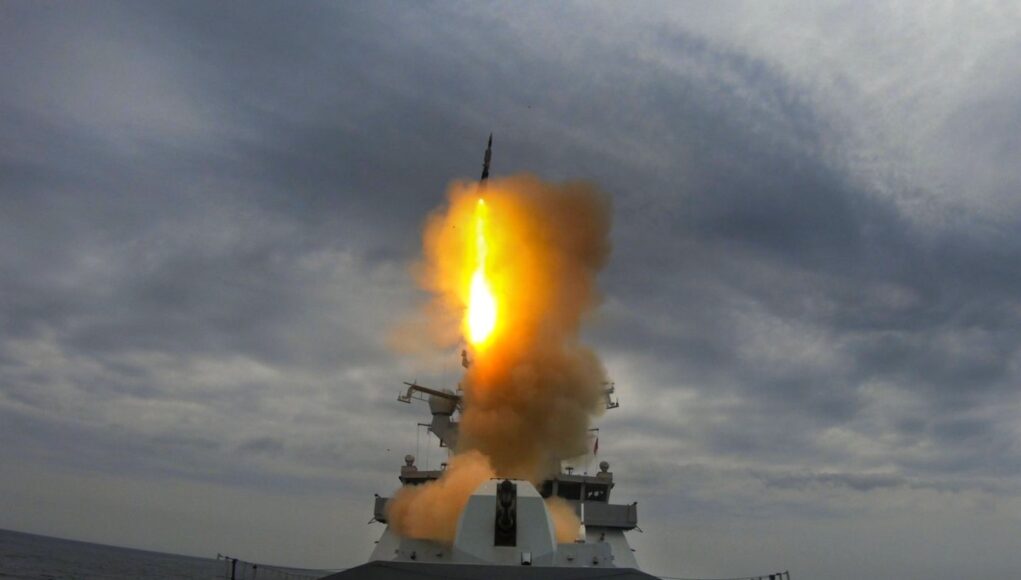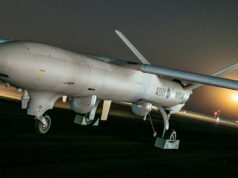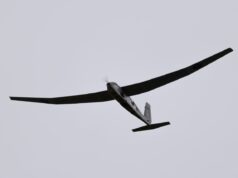During a parliamentary session, Julia Lopez, Conservative MP for Hornchurch and Upminster, pressed the government on reports that NATO has concerns about the UK’s contributions to the European defensive shield, highlighting potential vulnerabilities to missile attacks.
Lopez asked, “There were reports over the weekend of NATO worries that the UK is not contributing enough to the European defensive shield. That leaves us vulnerable to a missile attack. I hear what the Minister has said about the strategic defence review, but what assurance can he provide that he will look at our defence spending commitments with sufficient speed to provide good enough defence for our country?”
Responding, Armed Forces Minister Luke Pollard acknowledged the importance of addressing capability gaps while referencing the legacy of previous administrations. “The hon. Lady is right to raise the capability gaps that this Government inherited from the Government she served in,” he said.
Pollard reassured Parliament that the ongoing Strategic Defence Review (SDR) is focused on these issues. “The strategic defence review is looking at those capability gaps and at what is needed to protect ourselves and our allies in the future,” he stated.
He added that the outcomes of the review, due in the spring, would outline the government’s plans to address these gaps, “ensuring that we support British industry while also addressing the security challenges that we and our allies face.”
Last year, we reported that the UK’s missile defence capabilities are in urgent need of improvement, according to a new report from the House of Lords’ International Relations and Defence Committee.
Published on 26th September 2024, the report, titled “Ukraine: A Wake-Up Call”, highlights the UK’s vulnerabilities and calls for significant investment in integrated air and missile defence (IAMD), drawing on key lessons from Russia’s invasion of Ukraine.
Lord de Mauley, chair of the Committee, did not mince his words: “Successive governments have attempted to maintain the notion of the UK as a global power, but the war in Ukraine has been a wake-up call, laying bare the gap between that ambition and reality.”
One of the report’s central themes is the pressing need for the UK to invest in modern missile defences. The war in Ukraine has shown how crucial air superiority and missile defence are in today’s conflicts. The Committee stresses that the UK must not fall behind: “The war in Ukraine has demonstrated that air defences are essential to prevent attritional ground conflict,” the report states, urging the Government to make air and missile defence a top priority.
While the UK’s geographical position does offer some protection from direct missile strikes, the report warns against any sense of complacency: “Unlike Ukraine, the UK is comparatively protected by geographical distance from attacks by ground-based short-range missiles (and drones). However, there is no cause for complacency.”
The report further notes that in the event of a NATO conflict with Russia, the UK could become a key target due to its strategic role as a primary base for US forces entering Europe. The Committee highlights the fact that the UK remains vulnerable to “long-range missiles, submarine-launched missiles, and standoff munitions fired by combat aircraft and stealth fighters.”
A major concern highlighted by the Committee is the UK’s over-reliance on the United States for missile defence capabilities, a situation the report describes as “unsustainable.” The UK is heavily dependent on US assets for air defence, particularly in suppressing enemy air defences (SEAD). The Committee warns that “No European NATO air forces have sufficient expertise or munitions stocks to conduct suppression and destruction of enemy air defences (SEAD/DEAD) at scale.”
To mitigate this, the Committee calls for greater collaboration with European allies. It highlights the European Sky Shield Initiative (ESSI), a German-led project aimed at establishing a European air defence system, which the UK has expressed interest in joining. The report encourages the Government to seriously consider joining the ESSI and “provide an assessment of the merits of joining the initiative and update us on progress.”
The Committee points to successful European defence collaborations, such as the Aircraft Carrier Alliance, as models for how the UK could work with its partners to fill gaps in missile defence capabilities. “Working with our European NATO partners on interoperability and joint procurement to fill capability gaps makes great sense and can manage some of the high costs involved by helping to deliver economies of scale,” the report suggests.
The Committee does not shy away from criticising the UK’s previous lack of investment in missile defence, noting that while progress is being made, it remains slow: “While these developments are welcome, we note that they are still very much in their infancy and will require greater prioritisation, as well as significant time and investment to mature.”
The report references NATO’s 2023 Vilnius summit, where the importance of improving air defences was recognised, with commitments to enhance readiness and capabilities. However, the Committee urges the Government to accelerate its own efforts, pointing out that IAMD and SEAD/DEAD capabilities come at a “significant financial cost, both in terms of equipment and training.”
The UK has taken some initial steps, such as plans to enhance its maritime-based Sea Viper air defence system by 2028 and contribute to NATO’s Ballistic Missile Defence Radar. The report also highlights the Ministry of Defence’s DIAMOND initiative (Delivering Integrated Air and Missile Operational Networked Defences), which aims to improve interoperability with European allies.
Beyond missile defence, the report raises concerns about the broader risks to the UK’s critical national infrastructure (CNI), drawing parallels with the hybrid and conventional attacks Russia has launched against Ukraine’s CNI. The Committee calls for a “whole-of-Government effort” to strengthen the UK’s resilience against these threats, including from cyber and electromagnetic warfare.
“Russia has targeted Ukraine’s critical national infrastructure through hybrid and conventional attacks, and the UK is not exempt from these threats,” the report warns, urging the Government to take a more holistic approach to national defence.














The UK is not alone in being woefully unprepared for missile or drone based attacks. Issues in the red sea and Ukraine have highlighted how vulnerable nation states are to asymmetric attacks.
What is the UKs defence to 200 medium sized one way drones sent to hit the houses of parliament? T45 sits in the Thames and shoots down 20% of them with ludicrously expensive missiles? The boys are going to come with a whopping 6 sky sabres, legacy rapier and manpads? Get real.
Give every one union jack umbrellas to keep the missile’s off.
I wonder how many months have to go by before Pollard and Co. start to start taking responsibilty. The Tory record was not good but from what he says Labour are now going to fix everything presumably?
It’s so empty. Our lack of air and missile defence is nothing to do with 14 years of Conservative Government. It’s been downgraded and atrophed since the end of the Cold War. Labour massively reduced our conventional warfighting power in the 98 review by concentrating on expeditionary warfare to make the forces a ‘force for good in the world.’
Now, I actually think that review got it right and set up the structure that was broadly needed for the next 20 years.
But what Labour should really say now is “The situation has changed. We now face state on state threat to the UK and our allies for the first time in nearly 40 years and we need to regain conventional warfighting capability and air and missile defence.” That is far more credible than just saying the Tories let it get this way.
My issue is then world has got a lot more risky in the last decade, and during that time capability gaps were heavily exposed multiple times in iraq/afgan especially in the withdrawal and yet nothing was done about it. Prior to that it is understandable that defence might be less prioritied than other public sector expenditure.
I’m not saying Labour would have done better, too early to tell, but based on the Conservatives giving up governing and focusing on infighting, and having no record on any topic to stand on, I can’t help thinking they probably would have done a bit better.
That’s true but as a pensioner I dont want to see our young people dragged into a European Slugfest WW1 style for a 3rd time. Its not good for the gene pool. UK is now a shadow of its Imperial strength in 1939-45 or even the 70’s and would fully have its attention taken with a New Battle of the Atlantic, The Air War-ABM and more minor unspecified out of area activities perhaps keeping other trade routes and infrastructure safeguarded. When our battle group in Estonia is rubbed out, Supporting the Poles with munitions and The Nordics should be our next priority. Club Med can handle the Med. Recruiting and Training up an Army would be useful but deploying one into Europe until the 2nd or 3rd year is fiction. Lets see what Europe can come up with and see how long they can hold the Maginot Line without us.
What they can and can’t fix is mainly going to come down to budget and what gets cut and boosted.
Then there is what systems to use? Fixed ground based is vulnerable.
Should the U.K. be looking at ship based, rail based, aircraft based, road based mobile systems.
So ideally the U.K. will need ICBM interceptors protected by a medium range like sky sabre, which itself is protected by short range missile, gun combo.
I would go road/land based. Our history is fighting abroad and so whatever capability we build up needs to go with the fight and not all countries are islands for ships to cover and not all have friendly airbase near by for air craft plus aircraft can’t be on station 24/7.
For defence it will be years. Even if they flooded the MOD with money that gap can’t be closed over night. Agree they need to get the SDSR out and start taking actions but it’s a bit rich of the last goverment that had 14 years in power and cut everything during it to complain.
It is, and that’s politics.
Both are equally guilty.
But the wider public care not a jot.
We are still cutting conventional defence capability spending. Having ringfenced nuclear in 2023, with 40% of equipment spending planned to go to nuclear over the next ten years, we need to increase overall spending just to keep conventional capability spending at a standstill. It’s not a matter of closing the gap to some future nirvana. We need to stop the rot, not manage the decline.
Labour were the ones who dismantled a chunk of what little we had.
2 Rapier Regiments reduced to 1.
2 HVM Stsrstreak Regiments reduced to 1, so they could buy model aeroplanes for 47RA with Desert Hawk.
RAF Regiment Rapier Sqns cut in 2004 and “replaced” by the RA. Cobblers…they cut it.
I love how the playbook is blame the equally useless Tories for everything, when they themselves tore chunks out of conventional defence 97 to 2010.
Fair they equally did cuts, but air defence is an interesting one. In 97 there wasn’t really a threat that needed it and the whole of nato was more focused on air dominance.
Putting aside funding issues, it feels like western militaries are slow to react to new threats. We are 3 years into the Ukraine war, and even the US hasn’t invested in squad level drones, they are still focused on high budget ones, which have proven to be vulnerable. Some military strategy think tanks blame outdated nato tactics for Ukraine counter offensive failure.
Just look at the battle of Mogadishu, it should have been a wake up call for the us that the unarmored humvee wasn’t suitable and yet it took afgan/Iraq losses for them to eventually wake up. Same with the UK, lessons from the US failure should have been learnt but instead we went into afgran/iraq with snatch being the only available option.
The US Army has invested in and deployed drones all the way down to the platoon level.
Once again, you completely miss the point.
That would all have been dead handy against ballistic missiles.
At best labour might be able to fix one thing which is missile defence which is a clear gap that has rapidly evolved and it’s pretty easy to fix.
Everything else is relative and hard to fix as it’s hard to say there is even a problem.
With the F35 fleet at 70 plus aircraft and SPEAR 3 the UK has one of the best SEAD capabilities in the world.
The British government can order the extra F35’s but it has little control over LM being late on SPEAR 3.
As we seen, Israel took down Iran’s air defences with a smaller fleet of F35 than the UK and nothing as capable as SPEAR 3 onboard.
So saying the UK is reliant on the US for SEAD operations is a stupid statement.
What is the SEAD operation and why would the UK be conducting it without the USA. The UK has more than sufficient SEAD capability for any potential UK only operation and can make a meaningful contribution to a US/NATO operation.
The UK lacks sufficient SEAD to take out China on its own but so does the USA.
It’s the problem when people keep trying to review defence capabilities in a vaccum.
I think you seriously misunderstand the SEAD mission and to an even larger degree overestimate the UK or any European military’s ability to conduct it. There is a RUSI article discussing just this issue from around a year or two ago that is quite sobering.
“As we seen, Israel took down Iran’s air defences with a smaller fleet of F35 than the UK and nothing as capable as SPEAR 3 onboard.”
What are the air launched ballistic missiles that UK have?
My concern is putting aside who caused this mess (which realistically started in the 80s when most of the current kit was purchased and never replaced since, fixing it is now insanely difficult.
Price of upgrading a whole load of kit at the same time instead of doing it gradually over the last 4 decades, is unviable. Realistically we need a rethink of capability and accept we are no longer able to be a all capability nation and focus money.
The loss of most of the capacity to build anything to actually replace those 80s designs is probably the most damning aspect I think. There was no concern whatsoever about retaining that capacity just short sighted views that major conflicts were a thing of the past. Allowing your fighting vehicles is bad enough though with a level of comprehension after the fall of the Soviet Union but being serenaded by the view that there is no future major threat is unforgivable as is the loss as a result of those companies deeply involved in any future replacements affecting British industry and capability and leaving us effectively having to go cap in hand to foreign manufacturers hoping they will invest in uk production at best with some hope it will re establish the Uk capability that they so naively let dissipate due to short term thinking.
And that raises the associated problem they get the criticism long after they have disappeared from their roles and responsibility, jeez do we actually remember the collective individuals involved so perhaps from their short term thinking perspective their then priorities played out well at the time with the public, and therefore will we recognise, and it’s vital we do recognise, those who may be doing something similar today and deliberately delaying and avoiding decisions under the presumption that the US will be there or our European allies are closer to the front line so will take the brunt. Very naive.
Exactly the problem the Army now faces with replacing Challenger II, CVRT, Warrior, and AS90, all being left to rot from 1997 onwards.
Rather than a sensible incremental programof replacements.
This was then compounded by General Carter deciding Boxer had to be priority No 1, when in fact Ajax, WCSP, and Challenger 3 were to be dealt with first.
Up till 2010, only Titan, Terrier were acquired, with various panicked UORs on top. Years lost while fighting in the desert.
Damned Tories!!
And Trojan of course, of the RE fleet.
We need to think carefully about exactly what kind of defensive systems we need, if any. Israel, a nuclear power, has both elaborate missile defences and proven retaliatory capabilities. Yet it is still attacked on a regular basis. It is almost as though Israel’s enemies rely on its defences to minimize damage thus limiting the justification for counter strikes..Nuclear weapons do not, it seems, deter conventional attacks- they didn’t in the Falklands either- so what should UK try to do?
It is clear from Russian reaction that precision strikes by Ukraine on key infrastructure worry them,, perhaps as much for the effect on popular support as any military goal. It might be more sensible for UK to build up its long range conventional strike capability and rely on deterrence rather than spend vast sums on defensive systems that will never be 100% effective. Increasing local defence of critical infrastructure, military and civilian, should be considered and ought to be affordable. Trying to build defences against long range ballistic missiles would be very expensive and at best only partially effective.
I’m finding this an odd proposal from this nato committee? Uk are accused of not having missile defence and not having ability to attack missile launch sites. On the later we have f35b which is your 1st night of operation choice aircraft. We will hopefully develop missiles to suppress enemy air defence. So all looks good. On first point when did we ever have protection from missiles on mainland and only since sea based t45 ability came along. Please correct my uniformed assumptions.
Until 2028 or 2029 F-35 can only fire LGB’s
Government spokespersons will need to find a new excuse once SDR is published (June?) and fixes almost nothing because there is no substantial increase in the defence budget. The likely roadmap to 2.5% GDP will result in the MOD’s budget (£59.8 billion for 2025/26) increasing in real terms by about £1 bn a year, maxing at c.£4 bn extra from 2029/30 (or maybe 2030/31). In total that’s basically enough to cover the $17bn funding blackhole identified by the NAO in the MOD Equipment Plan 2023-2033, assuming no major cost overruns (improbable!) and no significant new procurements this decade (problematic for the SDR team!). Note that the government has decided not publish any information on the 2024 equipment plan – the kind of “temporary” measure that has a habit of becoming permanent.
Samp/t Block 1 NT and all the upcoming évolution are either in développement or in production ramp up. It could be wise that we increase production together. Anyway, relying on Israeli production comes with a twist: the home production of Israël is barely enough where et this country is under attack. Lately, they had to import urgently équipements from the US. US is allredy 13 Bn $ late for delivery to Taïwan, 10 to 15 years late for delivery to Australia. Waiting in the queue for US weapons is not to wise. And Trump will help Nato members only if 5% of GDP is spent on defense… While annexing Greenland and demanding free of tax access to European Market for US companies. We are next door. The time for a UK and France nuclear humbrella is 2025. Same thing with missile defense. It was brewing, now it is here. See you soon my friends!
I don’t think the report adds anything we didn’t already know about the defense capability, perhaps the criticism on the attack capabilities is somewhat surprising, I don’t know on what facts they are based it…
Anyway lesson learned from recent conflicts IMO
1. Nuclear deterrence is not a conventional deterrence.
2. Defense capabilities are a huge tactical advantage and a must have but can’t be a strategy, you must be able to hit back hard.
3. The “western comon sense” is not shared by our adversaries